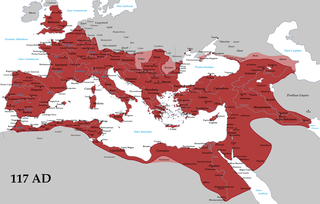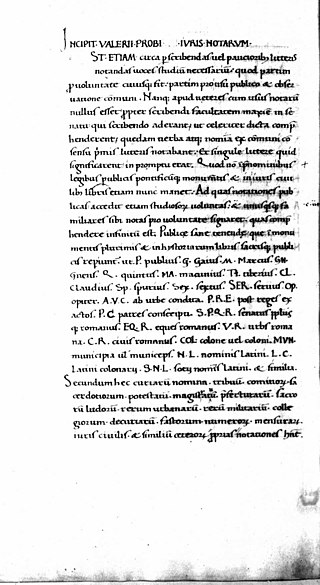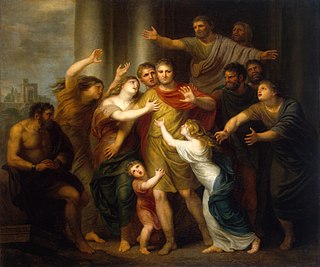Related Research Articles

The Roman Empire was the post-Republican state of ancient Rome and is generally understood to mean the period and territory ruled by the Romans following Octavian's assumption of sole rule under the Principate in 31 BC. It included territory in Europe, North Africa, and Western Asia, and was ruled by emperors. The fall of the Western Roman Empire in 476 conventionally marks the end of classical antiquity and the beginning of the Middle Ages.

Juba II or Juba of Mauretania was the son of Juba I and client king of Numidia and Mauretania. Aside from his very successful reign, he was a highly respected scholar and author. His first wife was Cleopatra Selene II, daughter of Queen Cleopatra VII of Ptolemaic Egypt and Roman Triumvir Mark Antony.

Jovian was Roman emperor from June 363 to February 364. As part of the imperial bodyguard, he accompanied Emperor Julian on his campaign against the Sasanian Empire. Julian was killed in battle, and the exhausted and ill-provisioned army declared Jovian his successor. Unable to cross the Tigris, Jovian extricated his troops from enemy territory by making peace with the Sasanids on humiliating terms. He spent the rest of his eight-month reign traveling back to Constantinople. After his arrival at Edessa, Jovian was petitioned by bishops over doctrinal issues concerning Christianity. He died at Dadastana, never having reached the capital.

Servius, distinguished as Servius the Grammarian, was a late fourth-century and early fifth-century grammarian. He earned a contemporary reputation as the most learned man of his generation in Italy; he authored a set of commentaries on the works of Virgil. These works, In Tria Virgilii Opera Expositio, Commentarii in Virgilium, Commentarii in Vergilii Opera, or Vergilii Carmina Commentarii, constituted the first incunable to be printed at Florence, by Bernardo Cennini, in 1471.
The Margites is a comic mock-epic ascribed to Homer that is largely lost. From references to the work that survived, it is known that its central character is an exceedingly stupid man named Margites, who was so dense he did not know which parent had given birth to him. His name gave rise to the recherché adjective margitomanēs (μαργιτομανής), "mad as Margites", used by Philodemus.
Nonius Marcellus was a Roman grammarian of the 4th or 5th century AD. His only surviving work is the De compendiosa doctrina, a dictionary or encyclopedia in 20 books that shows his interests in antiquarianism and Latin literature from Plautus to Apuleius. Nonius may have come from Africa.
Gaius Caesius Bassus was a Roman lyric poet who lived in the reign of Nero.

Marcus Valerius Probus, also known as M. Valerius Probus Berytius or Probus the Berytian, was a Roman grammarian and critic, who flourished during Nero's reign.
Lucius Annaeus Cornutus, a Stoic philosopher, flourished in the reign of Nero, when his house in Rome was a school of philosophy.
Terentianus, surnamed Maurus, was a Latin grammarian and writer on prosody who flourished probably at the end of the 2nd century AD.

The gens Atilia, sometimes written Atillia, was a plebeian family at ancient Rome, which rose to prominence at the beginning of the fourth century BC. The first member of this gens to attain the consulship was Marcus Atilius Regulus, in 335 BC. The Atilii continued to hold the highest offices of the state throughout the history of the Republic, and well into imperial times.

Late Latin is the scholarly name for the form of Literary Latin of late antiquity. English dictionary definitions of Late Latin date this period from the 3rd to the 6th centuries CE, and continuing into the 7th century in the Iberian Peninsula. This somewhat ambiguously defined version of Latin was used between the eras of Classical Latin and Medieval Latin. Scholars do not agree exactly when Classical Latin should end or Medieval Latin should begin.

Ancient Greek literature is literature written in the Ancient Greek language from the earliest texts until the time of the Byzantine Empire. The earliest surviving works of ancient Greek literature, dating back to the early Archaic period, are the two epic poems the Iliad and the Odyssey, set in an idealized archaic past today identified as having some relation to the Mycenaean era. These two epics, along with the Homeric Hymns and the two poems of Hesiod, the Theogony and Works and Days, constituted the major foundations of the Greek literary tradition that would continue into the Classical, Hellenistic, and Roman periods.
Acharya Pingala was an ancient Indian poet and mathematician, and the author of the Chandaḥśāstra, also called the Pingala-sutras, the earliest known treatise on Sanskrit prosody.

De Officiis is a 44 BC treatise by Marcus Tullius Cicero divided into three books, in which Cicero expounds his conception of the best way to live, behave, and observe moral obligations. The work discusses what is honorable, what is to one's advantage, and what to do when the honorable and private gain apparently conflict. For the first two books Cicero was dependent on the Stoic philosopher Panaetius, but wrote more independently for the third book.

The gens Caesia was a minor plebeian family at ancient Rome during the late Republic, and through to imperial times. The first member of this gens to achieve prominence was Marcus Caesius, praetor in 75 BC. Under the Empire, the Caesii were distinguished for their literary achievements.
This article is about the particular significance of the year 1728 to Wales and its people.
Marius Plotius Sacerdos was a Roman grammarian who flourished towards the end of the third century CE. He wrote an ars grammatica in three books, the third of which treats of meter.
Tyrannion, son of Artemidorus (Ἀρτεμίδωρος), was a Greek sophist from Phoenicia around the 1st century BCE. He was a pupil of Tyrannion of Amisus. He is also known as Tyrannion the Younger and his teacher as Tyrannion the Elder. His original name was Diocles (Διοκλῆς), and changed it to Tyrannion to honor his teacher.
References
- ↑ Kaster, Robert A. (1 Jan 1997). Guardians of Language: The Grammarian and Society in Late Antiquity. Oakland, California: University of California Press. p. 409. ISBN 978-0-520-21225-1 . Retrieved 10 February 2022.
- 1 2 von Albrecht, Michael (16 Sep 2019). A History of Roman Literature: From Livius Andronicus to Boethius : with Special Regard to Its Influence on World Literature. Leiden, Netherlands: BRILL. p. 1471. ISBN 978-9-004-10711-3 . Retrieved 10 February 2022.
- 1 2 One or more of the preceding sentences incorporates text from a publication now in the public domain : Chisholm, Hugh, ed. (1911). "Fortunatianus, Atilius". Encyclopædia Britannica . Vol. 10 (11th ed.). Cambridge University Press. p. 726.
- ↑ Elliott, Jackie (16 April 2018). Ennius and the Architecture of the Annales. Cambridge: Cambridge University Press. p. 448. ISBN 978-1-107-02748-0 . Retrieved 10 February 2022.
- ↑ Koerner, E.F.K. (28 Jun 2014). Concise History of the Language Sciences: From the Sumerians to the Cognitivists. Amsterdam: Elsevier. p. 116. ISBN 978-1-483-29754-5 . Retrieved 10 February 2022.
- ↑ Bischoff, Bernhard (12 April 1990). Latin Palaeography: Antiquity and the Middle Ages. Cambridge: Cambridge University Press. p. 192. ISBN 978-0-521-36726-4 . Retrieved 10 February 2022.
- ↑ Zetzel, James E. G. (16 April 2018). Critics, Compilers, and Commentators: An Introduction to Roman Philology, 200 BCE-800 CE. Oxford: Oxford University Press. p. 283. ISBN 978-0-195-38051-4 . Retrieved 10 February 2022.